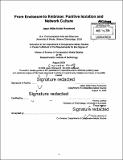From enclosure to embrace : punitive isolation and network culture
Author(s)
Rockwood, Jason Willis Krider
DownloadFull printable version (5.422Mb)
Other Contributors
MIT Comparative Media Studies/Writing.
Advisor
Henry Jenkins Ill.
Terms of use
Metadata
Show full item recordAbstract
Cultural theorists such as Henry Jenkins¹, Lawrence Lessig², Yochai Benkler³ , Robert Hassan⁴, and Manuel Castells⁵, have written extensively on the role of network communications technologies in reconfiguring contemporary culture. While the penetration of the "information society" is now widespread in U.S. culture⁶, not everyone is an equal participant⁷7. As an extreme case in point, the American prison population, currently at 2.3 million⁸, is institutionally excluded from equal participation in the information society and its network economies⁹ attributed by some scholars as due to the prison's historical logic of highly regulated communication flows¹⁰ Some theorists of network culture argue that one quality of network cultures is their tendency to be all-embracing: their connectivity has a compounding effect that encourages networks to become ever more dense¹¹ . Hassan calls this permeation of networks into culture the "network effect¹²," a compelling social pressure to participate more deeply in the information society. This network effect can be used as a theoretical lens for looking at prisons within society. An analysis of the debates surrounding correctional policy reveals the social forces both internal and external to the prison system pressuring prisons to adopt more liberal networked communication and attendant technologies. This juncture between isolation and networks is the central problematic nexus in contemporary debates about the role of prisons in society, their function and modes of operation. The prison has been historically defined in terms of communication-by the regulation and governance of it-and any attempt to understand or reform the prison must proceed from a communicative, as well as punitive, framework.
Description
Thesis: S.M. in Comparative Media Studies, Massachusetts Institute of Technology, Department of Humanities, Graduate Program in Science Writing, 2009. Cataloged from PDF version of thesis. Includes bibliographical references (pages 119-125).
Date issued
2009Department
Massachusetts Institute of Technology. Program in Comparative Media Studies/Writing; MIT Program in Writing & Humanistic StudiesPublisher
Massachusetts Institute of Technology
Keywords
Graduate Program in Science Writing., MIT Comparative Media Studies/Writing.